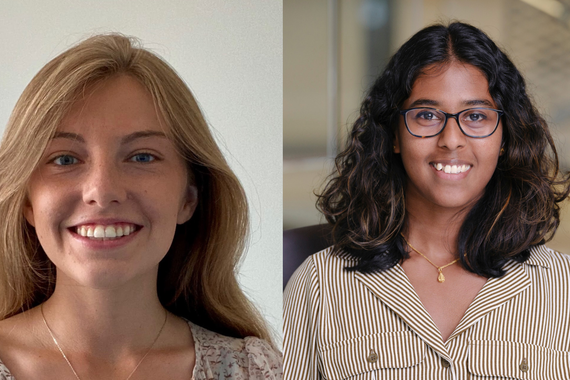Undergraduate Seniors are Awarded the Borine Award for Spring 2020
All students graduating with a psychology major complete a capstone project during their senior year. This project demonstrates expertise in an area of psychological research. The Sharon Borine Award for Top Capstone was established to recognize the best of these projects every semester; Psychology Honor Students are nominated yearly for the top prize. Capstone Student projects are reviewed by section leaders, the course instructor, and a group of faculty reviewers in the Department of Psychology to select and rank the recipients. Honors students are nominated by their faculty mentor and submissions are evaluated and ranked by a faculty panel.
Congratulations to the Spring 2020 recipients: Claudia Herbert, Samantha Gardow, Samuel Lee, and Rachel Jensen!
Claudia Herbert was awarded the top honors thesis award for the paper titled Redundancy gain in visual search of simulated X-ray images. Worked on a project under the mentorship of Yuhong Jiang. Herbert receives a $250.00 cash award.
I graduated in December from the University of Minnesota with a BS in Psychology with minors in Neuroscience and Public Health. Since graduating I have continued to work in my psychology and public health research assistant positions and have started a Masters in Teaching. In the fall I will be beginning work as an elementary school teacher in the Twin Cities through Teach for America. In my free time (pre-COVID) I enjoy thrifting, going to concerts, and trying new coffee shops.
My faculty mentor and I were interested in exploring the concept of redundancy gain. Redundancy gain is any benefit such as an increased perception or reaction time as a result of information that is presented in duplicate. In our series of experiments, we showed participants simulated x-ray images and asked them to judge whether or not there was a tumor present. Our results found that participants had significantly higher accuracy rates when presented with duplicate images vs being presented with a single image.
Samantha Gardow was awarded 1st place for the paper titled “Maternal Macronutrients and Fetal Growth Trajectories.” Gardow receives a $250.00 cash award.
I am proud to say that I am a first-generation student who earned my Bachelor of Arts degree in Psychology with minors in Developmental Psychology and Neuroscience. I plan to pursue a PhD in Child Clinical Psychology. My dream is to earn an academic position and establish a research program that not only serves the communities that it studies but cultivates and inspires new generations of researchers. My hope is that my work on the mechanisms of risk and resilience will be a catalyst for change in how we advocate for pregnant women and their developing children.
I was fortunate enough to play a major role in data collection and data entry/analysis for the WISHES study (which my work branches from). I have had the opportunity to assist with participant pre- and post-natal visits and have been an active member in scoring questionnaires, data entry, database creation, syntax development, and conducting data analyses. This capstone project has allowed me to delve deeply into an unfamiliar topic, to grapple with the task of incorporating existing research findings into my own hypotheses, and to work as part of a small collaborative team. This experience has exposed me to the active, generative dialogue that a research team provides and has solidified my decision to pursue a PhD in Child Clinical Psychology.
I would like to thank everyone in the Gunnar Laboratory for Developmental Psychobiology Research, especially Mariann Howland, Bonny Donzella, and Colleen Doyle, for their exceptional guidance and support throughout my undergraduate career.
Samuel Lee receives 2nd place for the paper titled “Association of Race/Ethnicity and Household Income on Health Care Usage,” with a cash award of $150.00.
I am originally from Illinois and was attracted to the U because of its reputation for research. I knew I wanted to be a psychology major, but I did not know what else I was interested in. The very first psychology course I took was a freshman seminar about immigration, mental health, and the Asian American experience. Since that course, I have worked for FamiLee Lab on projects about ethnic-racial socialization, ethnic teasing, interracial dating, and health disparities. I hope to continue conducting research in some form during a gap year or two before eventually pursuing a career in health care.
My capstone project is about health care usage in Hennepin County. I used the 2018 edition of SHAPE which is a survey that Hennepin County collects every four years to gather data about the general health of the community, factors that impact health, and health differences between populations. Generally, my project found that racial/ethnic minority groups and those with lower household incomes had lower rates of health care usage than expected. It also found that non-minority groups and those with higher household incomes had higher rates of health care usage than expected.
I would like to thank Richard Lee, Christine Wu, and the entirety of the FamiLee lab for their continued support and encouragement during my time at the U.
Rachel Jensen awarded 3rd place for the paper titled “Intergenerational Transmission of Violence: A Review of Biological Mechanisms,” and receives the cash award of $75.00
Rachel Jensen is a local Minneapolitan, having lived in the urban core of the Twin Cities metro her entire life. She knew she wanted a career in the biological sciences in which she could help others, and initially enrolled in the school of public health before transferring to psychology for her final years at the University. She realized her goals and graduated in May with a bachelor’s degree in psychology.
Jensen's work for her senior project reviewed research on DNA methylation and other biological mechanisms implicated in the intergenerational familial consequences of violence. Her paper proposes that parental exposure to violence during childhood causes enduring molecular biological changes, which cause subsequent behavioral modifications that may negatively impact parenting quality. This diminished parenting behavior, in turn, carries implications for the next generation and may contribute to intergenerational cyclical patterns of violent behavior. "My interest in behavioral genetics stems from PSY 5137 coursework, which combined elements from my biochemistry background and current psychology studies," she said.
During her senior year, Jensen worked with The Advocates for Human Rights, an organization that observes court proceedings for human rights violations and collects data used to implement policy changes. As a court observer, Jensen's work entailed monitoring and recording differential outcomes experienced by individuals of different races and genders who, as a result of violent incidents, found themselves enmeshed in the Hennepin County Minnesota family, juvenile and criminal courts. This work, like nearly all other essential and non-essential activity, was disrupted by the civil emergency due to the novel coronavirus, declared in the spring of 2020, but Jensen anticipates that after graduation, as the state of emergency conditions are eased, she will continue her work with the Advocates for Human Rights during a "gap" year. She anticipates attending graduate school beginning in 2021.


